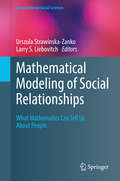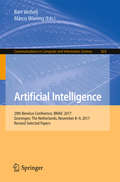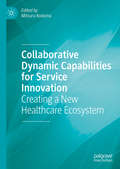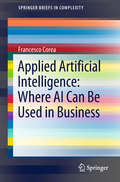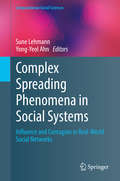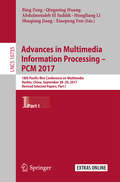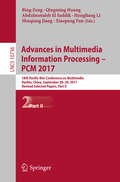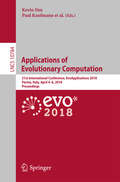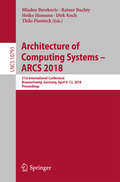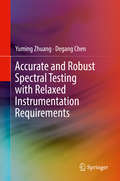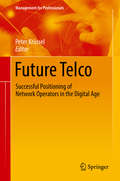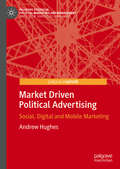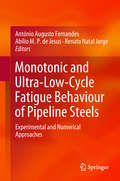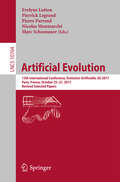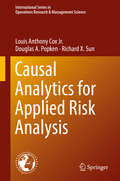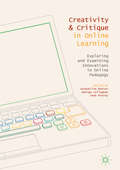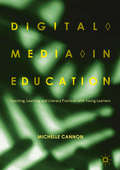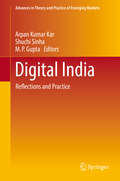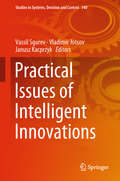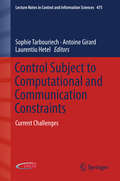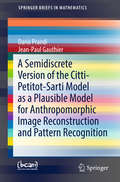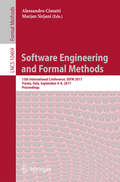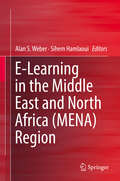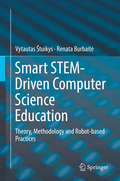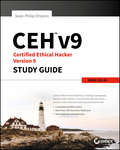- Table View
- List View
Mathematical Modeling of Social Relationships: What Mathematics Can Tell Us About People (Computational Social Sciences)
by Larry S. Liebovitch Urszula Strawinska-ZankoThis edited volume presents examples of social science research projects that employ new methods of quantitative analysis and mathematical modeling of social processes. This book presents the fascinating areas of empirical and theoretical investigations that use formal mathematics in a way that is accessible for individuals lacking extensive expertise but still desiring to expand their scope of research methodology and add to their data analysis toolbox. Mathematical Modeling of Social Relationships professes how mathematical modeling can help us understand the fundamental, compelling, and yet sometimes complicated concepts that arise in the social sciences. This volume will appeal to upper-level students and researchers in a broad area of fields within the social sciences, as well as the disciplines of social psychology, complex systems, and applied mathematics.
Artificial Intelligence: 29th Benelux Conference, BNAIC 2017, Groningen, The Netherlands, November 8-9, 2017, Revised Selected Papers (Communications In Computer And Information Science #823)
by Bart Verheij Marco WieringThis book contains a selection of the best papers of the 29th Benelux Conference on Artificial Intelligence, BNAIC 2017, held in Groningen, The Netherlands, in November 2017. <p><p> The 11 full papers presented in this volume were carefully reviewed and selected from 30 submissions. They address various aspects of artificial intelligence such as natural language processing, agent technology, game theory, problem solving, machine learning, human-agent interaction, AI and education, and data analysis.
Collaborative Dynamic Capabilities for Service Innovation: Creating a New Healthcare Ecosystem
by Mitsuru KodamaExploring the theoretical concept of collaborative dynamic capabilities, this book illustrates how service innovation can be achieved in an era of technological convergence. Focusing on e-healthcare systems within hospitals and private businesses, the author provides detailed case studies and answers topical questions about generating service innovation across different industries. Making a new and thought-provoking contribution to research on innovation and technology management, this useful book engages with theory and provides applicable solutions for practitioners to implement in the future.
Applied Artificial Intelligence: Where AI Can Be Used In Business (Springerbriefs In Complexity Ser.)
by Francesco CoreaThis book deals with artificial intelligence (AI) and its several applications. It is not an organic text that should be read from the first page onwards, but rather a collection of articles that can be read at will (or at need). The idea of this work is indeed to provide some food for thoughts on how AI is impacting few verticals (insurance and financial services), affecting horizontal and technical applications (speech recognition and blockchain), and changing organizational structures (introducing new figures or dealing with ethical issues). <P><P> The structure of the chapter is very similar, so I hope the reader won’t find difficulties in establishing comparisons or understanding the differences between specific problems AI is being used for. The first chapter of the book is indeed showing the potential and the achievements of new AI techniques in the speech recognition domain, touching upon the topics of bots and conversational interfaces. The second and thirds chapter tackle instead verticals that are historically data-intensive but not data-driven, i.e., the financial sector and the insurance one. The following part of the book is the more technical one (and probably the most innovative), because looks at AI and its intersection with another exponential technology, namely the blockchain. Finally, the last chapters are instead more operative, because they concern new figures to be hired regardless of the organization or the sector, and ethical and moral issues related to the creation and implementation of new type of algorithms.
Complex Spreading Phenomena in Social Systems: Influence and Contagion in Real-World Social Networks (Computational Social Sciences)
by Yong-Yeol Ahn Sune LehmannThis text is about spreading of information and influence in complex networks. Although previously considered similar and modeled in parallel approaches, there is now experimental evidence that epidemic and social spreading work in subtly different ways. While previously explored through modeling, there is currently an explosion of work on revealing the mechanisms underlying complex contagion based on big data and data-driven approaches.This volume consists of four parts. Part 1 is an Introduction, providing an accessible summary of the state of the art. Part 2 provides an overview of the central theoretical developments in the field. Part 3 describes the empirical work on observing spreading processes in real-world networks. Finally, Part 4 goes into detail with recent and exciting new developments: dedicated studies designed to measure specific aspects of the spreading processes, often using randomized control trials to isolate the network effect from confounders, such as homophily. Each contribution is authored by leading experts in the field. This volume, though based on technical selections of the most important results on complex spreading, remains quite accessible to the newly interested. The main benefit to the reader is that the topics are carefully structured to take the novice to the level of expert on the topic of social spreading processes. This book will be of great importance to a wide field: from researchers in physics, computer science, and sociology to professionals in public policy and public health.
Advances in Multimedia Information Processing – PCM 2017: 18th Pacific-Rim Conference On Multimedia, Harbin, China, September 28-29, 2017, Revised Selected Papers, Part I (Lecture Notes in Computer Science #10735)
by Abdulmotaleb El Saddik Hongliang Li Qingming Huang Bing Zeng Shuqiang Jiang Xiaopeng FanThe two-volume set LNCS 10735 and 10736 constitutes the thoroughly refereed proceedings of the 18th Pacific-Rim Conference on Multimedia, PCM 2017, held in Harbin, China, in September 2017.<P><P> The 184 full papers presented were carefully reviewed and selected from 264 submissions. The papers are organized in topical sections on: Best Paper Candidate; Video Coding; Image Super-resolution, Debluring, and Dehazing; Person Identity and Emotion; Tracking and Action Recognition; Detection and Classification; Multimedia Signal Reconstruction and Recovery; Text and Line Detection/Recognition; Social Media; 3D and Panoramic Vision; Deep Learning for Signal Processing and Understanding; Large-Scale Multimedia Affective Computing; Sensor-enhanced Multimedia Systems; Content Analysis; Coding, Compression, Transmission, and Processing.
Advances in Multimedia Information Processing – PCM 2017: 18th Pacific-Rim Conference On Multimedia, Harbin, China, September 28-29, 2017, Revised Selected Papers, Part II (Lecture Notes in Computer Science #10736)
by Abdulmotaleb El Saddik Hongliang Li Qingming Huang Bing Zeng Shuqiang Jiang Xiaopeng FanThe two-volume set LNCS 10735 and 10736 constitutes the thoroughly refereed proceedings of the 18th Pacific-Rim Conference on Multimedia, PCM 2017, held in Harbin, China, in September 2017.<P><P> The 184 full papers presented were carefully reviewed and selected from 264 submissions. The papers are organized in topical sections on: Best Paper Candidate; Video Coding; Image Super-resolution, Debluring, and Dehazing; Person Identity and Emotion; Tracking and Action Recognition; Detection and Classification; Multimedia Signal Reconstruction and Recovery; Text and Line Detection/Recognition; Social Media; 3D and Panoramic Vision; Deep Learning for Signal Processing and Understanding; Large-Scale Multimedia Affective Computing; Sensor-enhanced Multimedia Systems; Content Analysis; Coding, Compression, Transmission, and Processing.
Applications of Evolutionary Computation: 21st European Conference, Evoapplications 2018, Parma, Italy, April 4-6, 2018, Proceedings (Lecture Notes in Computer Science #10784)
by Kevin Sim Paul KaufmannThis book constitutes the refereed conference proceedings of the 21st International Conference on the Applications of Evolutionary Computation, EvoApplications 2018, held in Parma, Italy, in April 2018, collocated with the Evo* 2018 events EuroGP, EvoCOP, and EvoMUSART. <P><P> The 59 revised full papers presented were carefully reviewed and selected from 84 submissions. EvoApplications 2018 combined research from 14 different domains: business analytics and finance (EvoBAFIN); computational biology (EvoBIO); communication networks and other parallel and distributed systems (EvoCOMNET); complex systems (EvoCOMPLEX); energy-related optimization (EvoENERGY); games and multi-agent systems (EvoGAMES); image analysis, signal processing and pattern recognition (EvoIASP); realworld industrial and commercial environments (EvoINDUSTRY); knowledge incorporation in evolutionary computation (EvoKNOW); continuous parameter optimization (EvoNUM); parallel architectures and distributed infrastructures (EvoPAR); evolutionary robotics (EvoROBOT); nature-inspired algorithms in software engineering and testing (EvoSET); and stochastic and dynamic environments (EvoSTOC).
Architecture of Computing Systems – ARCS 2018: 31st International Conference, Braunschweig, Germany, April 9-12, 2018. Proceedings (Lecture Notes in Computer Science #10793)
by Dirk Koch Thilo Pionteck Heiko Hamann Mladen Berekovic Rainer BuchtyThis book constitutes the proceedings of the 31st International Conference on Architecture of Computing Systems, ARCS 2018, held in Braunschweig, Germany, in April 2018.<P><P> The 23 full papers presented in this volume were carefully reviewed and selected from 53 submissions. ARCS has always been a conference attracting leading-edge research outcomes in Computer Architecture and Operating Systems, including a wide spectrum of topics ranging from embedded and real-time systems all the way to large-scale and parallel systems.
Accurate and Robust Spectral Testing with Relaxed Instrumentation Requirements
by Yuming Zhuang Degang ChenThis book introduces a family of new methods for accurate and robust spectral testing and fills an information gap, as the requirements in standard test have grown increasingly challenging in recent high precision testing, especially as the device performance has continued to improve. Test engineers will be enabled to accurately set their devices & systems at much simpler test setup, much reduced complexity and much lower cost.
Future Telco: Successful Positioning of Network Operators in the Digital Age (Management for Professionals)
by Peter KrüsselThis book examines the extensive changes in markets, technologies and value chains that telecommunication companies are currently confronted with. It analyzes the crossroads they have reached and the choices that now need to be made – to be a bit pipe or a trendsetter of digitalization. Based on an analysis of the key challenges for telcos, the book derives future market scenarios and puts forward recommendations for how they can successfully position themselves. It proposes a framework based on seven “levers,” which addresses concrete measures in each step of the value chain, ranging from technology, IT and processes, to innovation, marketing and sales issues. The book discusses the current challenges and provides both general recommendations and concrete solutions. Respected experts illustrate innovative strategic and technical trends and provide insights gained in real-life transformation projects. Recent developments in the areas of regulation, product development, competition between over-the-top (OTT) providers and telcos, as well as technical innovations like 5G, SDN/NFV, LEO satellites and MEC are discussed. Accordingly, practitioners, managers and researchers alike will benefit from the book’s wealth of examples and up-to-date insights.
Market Driven Political Advertising: Social, Digital and Mobile Marketing (Palgrave Studies in Political Marketing and Management)
by Andrew HughesExploring the new era of political advertising beyond television and print, this book focuses on the mediums of the new millennia that are transforming campaigning and communications in political systems around the world. The author illustrates how the use of social, digital and mobile advertising enables political marketers to deliver messages more accurately and strengthen relationships between stakeholders such as voters, supporters and candidates. Examining digital and social media platforms such as Facebook, Twitter and YouTube, this innovative book analyses the changing political marketing landscape and proposes conceptual models for implementing more successful and effective political communications in the future.
Monotonic and Ultra-Low-Cycle Fatigue Behaviour of Pipeline Steels: Experimental and Numerical Approaches
by Renato Natal Jorge António Augusto Fernandes Abílio M.P. JesusThis book covers the development of innovative computational methodologies for the simulation of steel material fracture under both monotonic and ultra-low-cycle fatigue. The main aspects are summarised as follows: i) Database of small and full-scale testing data covering the X52, X60, X65, X70 and X80 piping steel grades. Monotonic and ULCF tests of pipe components were performed (buckled and dented pipes, elbows and straight pipes). ii) New constitutive models for both monotonic and ULCF loading are proposed. Besides the Barcelona model, alternative approaches are presented such as the combined Bai-Wierzbicki-Ohata-Toyoda model. iii) Developed constitutive models are calibrated and validated using experimentally derived testing data. Guidelines for damage simulation are included. The book could be seen as a comprehensive repository of experimental results and numerical modeling on advanced methods dealing with Ultra Low Cycle Fatigue of Pipelines when subjected to high strain loading conditions.
Artificial Evolution: 6th International Conference, Evolution Artificielle, EA 2003, Marseilles, France, October 27-30 2003 (Lecture Notes in Computer Science #2936)
by Pierrick Legrand Nicolas Monmarché Evelyne Lutton Marc Schoenauer Pierre ParrendThis book constitutes the thoroughly refereed post-proceedings of the 6th International Conference on Artificial Evolution, EA 2003, held in Marseilles, France in October 2003.<P><P> The 32 revised full papers presented were carefully selected and improved during two rounds of reviewing and revision. The papers are organized in topical sections on theoretical issues, algorithmic issues, applications, implementation issues, genetic programming, coevolution and agent systems, artificial life, and cellular automata.
Causal Analytics for Applied Risk Analysis (International Series in Operations Research & Management Science #270)
by Louis Anthony Cox Jr. Douglas A. Popken Richard X. SunCausal analytics methods can revolutionize the use of data to make effective decisions by revealing how different choices affect probabilities of various outcomes. This book presents and illustrates models, algorithms, principles, and software for deriving causal models from data and for using them to optimize decisions with uncertain outcomes. It discusses how to describe and summarize situations; detect changes; evaluate effects of policies or interventions; learn what works best under different conditions; predict values of as-yet unobserved quantities from available data; and identify the most likely explanations for observed outcomes, including surprises and anomalies. The book resents practical techniques for causal modeling and analytics that practitioners can apply to improve understanding of how choices affect probabilities of consequences and, based on this understanding, to recommend choices that are more likely to accomplish their intended objectives.The book begins with a survey of modern analytics methods, focusing mainly on techniques useful for decision, risk, and policy analysis. Chapter 2 introduces free in-browser software, including the Causal Analytics Toolkit (CAT) software, to enable readers to perform the analyses described and to apply modern analytics methods easily to their own data sets. Chapters 3 through 11 show how to apply causal analytics and risk analytics to practical risk analysis challenges, mainly related to public and occupational health risks from pathogens in food or from pollutants in air. Chapters 12 through 15 turn to broader questions of how to improve risk management decision-making by individuals, groups, organizations, institutions, and multi-generation societies with different cultures and norms for cooperation. These chapters examine organizational learning, community resilience, societal risk management, and intergenerational collaboration and justice in managing risks.
Creativity and Critique in Online Learning: Exploring and Examining Innovations in Online Pedagogy
by Jacqueline Baxter George Callaghan Jean McAvoyThis book explores emerging practices in distance education that have been facilitated by the development of educational technology. The volume examines core themes in distance education including online education at scale, embodiment in online environments, connectivity in online education and the personalisation of learning experiences within online education. The first section of the book examines online teaching tools, and explores how they are being used to enhance and promote student learning. The second looks at some of the broader challenges encountered by online teachers and those responsible for designing online learning material. While this volume will be of significant interest to distance learning universities and colleges, it will also be a valuable resource to traditional Higher Education Institutions, who are increasingly searching for innovative ways to reach and teach their students. This edited collection will be of value to scholars of online education as well as practitioners and policy makers looking to enrich their notions of online pedagogy.
Digital Media in Education: Teaching, Learning and Literacy Practices with Young Learners
by Michelle CannonThis book argues for dynamic and relevant school experiences for primary and early secondary learners that embed digital media production. It proposes a vision of literacy that combines new technologies with multiple modes of meaning-making. Drawing on theories related to cultural studies, media literacy, anthropology, and creativity, the author explores learning strategies with digital media based on an empowering, values-driven framework. The book advances innovative teaching methods, critiquing educational ‘reforms’ that marginalise media and fail to engage with the complex tensions and textures of modern pedagogy. Positioning film and media-making as vital practices in schools that nurture the skills, dispositions and competencies of modern literacy, the model foregrounds connections between human agency, cognition, and creative practice. This innovative book will appeal to students and scholars of creativity, digital media production, primary education and literacy.
Digital India: Reflections and Practice (Advances in Theory and Practice of Emerging Markets #10595)
by Arpan Kumar Kar M. P. Gupta Shuchi SinhaThis book offers a multidisciplinary resource on digital government, while specifically focusing on its role within the emerging market of India. The Government of India (GoI) is concentrating on transforming India under the Digital India initiative. In order to do so, it has emphasized three core areas: (1) Computing infrastructure as a utility to every citizen; (2) Governance and services on demand; and (3) Digital empowerment of citizens. The chapters in this book address issues surrounding these areas, highlighting concepts such as knowledge societies, urban operations and logistics, issues in managing emergent Information Communication Technologies (ICTs), and also smart analytics for urbanization. The chapters contribute to the theory, practice and policy for a “Digital India.” The book captures lessons, knowledge, experiences (about challenges, drivers, antecedents, etc.) and best practices emerging from implementation of various projects. While the book is dedicated to a “Digital India,” this book can also be valuable resource for public administrators, government officials and researchers in other emerging markets and developing countries in Asia, Africa and Latin America where similar socio-political and economic conditions exist.
Practical Issues of Intelligent Innovations (Studies in Systems, Decision and Control #140)
by Janusz Kacprzyk Vassil Sgurev Vladimir JotsovThis book presents recent advances in the field of intelligent systems. Composed of fourteen selected chapters, it covers a wide range of research that varies from applications in industrial data science to those in applied science. Today the word INNOVATION is more and more connected with the words INTELLIGENT and SECURITY, as such the book discusses the theory and applications of hot topics such as big data, education applications of robots with different levels of autonomy, knowledge-based modeling and control of complex dynamical systems, sign-based synthesis of behavior, security issues with intelligent systems, innovative intelligent control design, neuromorphic computation, data-driven classification, intelligent modeling and measurement innovations, multisensor data association, personal education assistants, a modern production architecture, study of peer review and scientometrics, intelligent research on bug report data, and clustering non-Gaussian data. The broad and varied research discussed represents the mainstream of contemporary intelligent innovations that are slowly but surely changing the world.
Control Subject to Computational and Communication Constraints: Current Challenges (Lecture Notes in Control and Information Sciences #475)
by Sophie Tarbouriech Laurentiu Hetel Antoine GirardThis book provides a broad overview of the current problems, challenges and solutions in the field of control theory, communication theory and computational resources management. Recent results on dynamical systems, which open new opportunities for research and challenges to be addressed in the future, are proposed in the context of computational and communication constraints. In order to take into the account complex phenomena, such as nonlinearities, time-varying parameters and limited availability of information, the book proposes new approaches for open problems with both theoretical and practical significance. The contributors’ research is centred on robust stability and performance of control loops that are subject to computational and communication constraints. A particular focus is placed on the presence of constraints in communication and computation, which is a critical issue in networked control systems and cyber-physical systems. The contributions, which rely on the development of novel paradigms are provided are by leading experts in the field from all over the world, thus providing readers with the most accurate solutions for the constraints. Control subject to Computational and Communication Constraints highlights many problems encountered by control researchers, while also informing graduate students of the many interesting ideas at the frontier between control theory, information theory and computational theory. The book is also a useful point of reference for engineers and practitioners, and the survey chapters will assist instructors in lecture preparation.
A Semidiscrete Version of the Citti-Petitot-Sarti Model as a Plausible Model for Anthropomorphic Image Reconstruction and Pattern Recognition (SpringerBriefs in Mathematics)
by Jean-Paul Gauthier Dario PrandiThis book proposes a semi-discrete version of the theory of Petitot and Citti-Sarti, leading to a left-invariant structure over the group SE(2,N), restricted to a finite number of rotations. This apparently very simple group is in fact quite atypical: it is maximally almost periodic, which leads to much simpler harmonic analysis compared to SE(2). Based upon this semi-discrete model, the authors improve on previous image-reconstruction algorithms and develop a pattern-recognition theory that also leads to very efficient algorithms in practice.
Software Engineering and Formal Methods: 15th International Conference, SEFM 2017, Trento, Italy, September 4–8, 2017, Proceedings (Lecture Notes in Computer Science #10469)
by Marjan Sirjani Alessandro CimattiThis book constitutes the refereed proceedings of the 15th International Conference on Software Engineering and Formal Methods, SEFM 2017, held in Trento, Italy, in September 2017. The 17 full papers and 6 short papers presented were carefully reviewed and selected from 102 submissions. The papers deal with a large range of topics in the following research areas: new frontiers in software architecture; software verification and testing; software development methods; application and technology transfer; security and safety; an d design principles.
E-Learning in the Middle East and North Africa (MENA) Region
by Alan S. Weber Sihem HamlaouiIn the last decade, due to factors of ICT infrastructural and broadband maturation, rising levels of educational attainment and computer literacy, and diversification strategies, e-learning has exploded in the Middle East and North Africa (MENA) region. However, significant barriers remain in the region’s e-learning development: lack of research on outcomes and effectiveness, paucity of Arabic language learning objects, monopolies and high cost of telecommunications, cultural taboos, accreditation, censorship, and teacher training.This unique volume is the first comprehensive effort to describe the history, development, and current state of e-learning in each of the 20 MENA countries from Algeria to Yemen. Each entry is expertly written by a specialist who is acutely familiar with the state of e-learning in their respective country, and concludes with a bibliography of key reports, peer-reviewed books and articles, and web resources.E-Learning in the Middle East and North Africa (MENA) proves itself as a vital compendium for a wide readership that includes academics and students, transnational program directors, international education experts, MENA government departments, commercial vendors and investors, and ICT development and regulatory agencies involved in e-learning in the Middle East.
Smart STEM-Driven Computer Science Education: Theory, Methodology and Robot-based Practices
by Vytautas Štuikys Renata BurbaitėAt the centre of the methodology used in this book is STEM learning variability space that includes STEM pedagogical variability, learners’ social variability, technological variability, CS content variability and interaction variability. To design smart components, firstly, the STEM learning variability space is defined for each component separately, and then model-driven approaches are applied. The theoretical basis includes feature-based modelling and model transformations at the top specification level and heterogeneous meta-programming techniques at the implementation level.Practice includes multiple case studies oriented for solving the task prototypes, taken from the real world, by educational robots. These case studies illustrate the process of gaining interdisciplinary knowledge pieces identified as S-knowledge, T-knowledge, E-knowledge, M-knowledge or integrated STEM knowledge and evaluate smart components from the pedagogical and technological perspectives based on data gathered from one real teaching setting. Smart STEM-Driven Computer Science Education: Theory, Methodology and Robot-based Practices outlines the overall capabilities of the proposed approach and also points out the drawbacks from the viewpoint of different actors, i.e. researchers, designers, teachers and learners.
CEH v9: Certified Ethical Hacker Version 9
by OriyanoThe ultimate preparation guide for the unique CEH exam. The CEH v9: Certified Ethical Hacker Version 9 Study Guide is your ideal companion for CEH v9 exam preparation. This comprehensive, in-depth review of CEH certification requirements is designed to help you internalize critical information using concise, to-the-point explanations and an easy-to-follow approach to the material. Covering all sections of the exam, the discussion highlights essential topics like intrusion detection, DDoS attacks, buffer overflows, and malware creation in detail, and puts the concepts into the context of real-world scenarios. Each chapter is mapped to the corresponding exam objective for easy reference, and the Exam Essentials feature helps you identify areas in need of further study. You also get access to online study tools including chapter review questions, full-length practice exams, hundreds of electronic flashcards, and a glossary of key terms to help you ensure full mastery of the exam material. The Certified Ethical Hacker is one-of-a-kind in the cybersecurity sphere, allowing you to delve into the mind of a hacker for a unique perspective into penetration testing. This guide is your ideal exam preparation resource, with specific coverage of all CEH objectives and plenty of practice material. Review all CEH v9 topics systematically Reinforce critical skills with hands-on exercises Learn how concepts apply in real-world scenarios Identify key proficiencies prior to the exam The CEH certification puts you in professional demand, and satisfies the Department of Defense's 8570 Directive for all Information Assurance government positions. Not only is it a highly-regarded credential, but it's also an expensive exam--making the stakes even higher on exam day. The CEH v9: Certified Ethical Hacker Version 9 Study Guide gives you the intense preparation you need to pass with flying colors.
